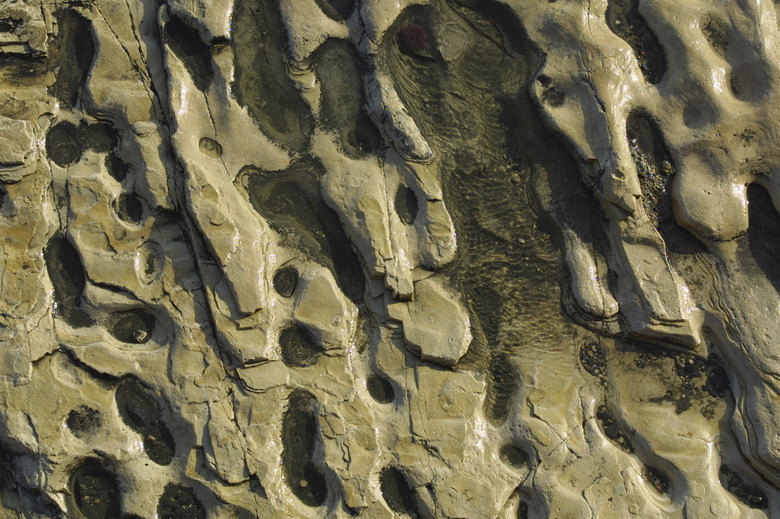Oil & Gas Are Found In What Kind Of Rocks?
The types of rocks that contain oil and natural gas are all sedimentary rocks, rocks formed when grains and mineral particles deposited by running water fuse together. Because these rocks are cemented together from such small components, they are porous, full of spaces in which energy-rich carbon compounds can settle, later to be liberated in the form of either oil or gas.
Shale
Shale
Shale is a sedimentary rock frequently mentioned as a natural fuel source, likely because of its abundance (42 percent of all sedimentary rock is estimated to be shale) and its composition. It is produced when layers of carbon-rich mud are compressed until they harden into rock that retains those layers. One type of shale contains so much kerogen, the organic solid that gets processed into oil and gas, that it actually is called "oil shale."
Sandstone
Sandstone
Other types of especially porous rocks often form above shale beds, trapping the low-density carbon compounds that may rise through the mud that becomes shale in their spaces. Sandstone is one such rock, created from grains of minerals like quartz bound by other compounds, such as silica. Within sandstone beds, carbon compounds generally exist in liquid form, as crude oil, that in some cases also releases natural gas when brought to Earth's surface.
Carbonates
Carbonates
Like sandstone, carbonates are sedimentary rocks commonly found in conjunction with shale. Carbonates, however, are formed largely from remains of marine life, particularly shells and bones, combined with other minerals. Because of this, they are full of calcium and other compounds that lead to their classification: limestones, which contain calcium carbonate, and dolomites, which contain calcium magnesium carbonate. The spaces between their fused fragments are where oil and gas may be found.
Extraction
Extraction
The processes to release these energy-rich substances from the rock that holds them rarely are as simple as siphoning oil or gas from sedimentary rock's pores. Researchers, however, have developed ways to make extraction easier. Heating the kerogen contained in shale, for example, produces gas and liquid oil that flows readily to the surface, while hydraulic fracturing applies high-pressure liquid streams to sedimentary rocks to exploit their fissures, allowing oil and gas to move freely.
References
- Boise State University: Rock Identification
- Penn State University: Petroleum
- Geology.com: Shale
- Sand Atlas: Oil Shale
- United States General Service Administration: Limestone: Characteristics, Uses And Problems
- Shell Global: Extracting Heavy Oil
- United States Environmental Protection Agency: Hydraulic Fracturing Background Information
Cite This Article
MLA
Johnson, Sheila. "Oil & Gas Are Found In What Kind Of Rocks?" sciencing.com, https://www.sciencing.com/oil-gas-are-found-in-what-kind-of-rocks-12731055/. 12 December 2013.
APA
Johnson, Sheila. (2013, December 12). Oil & Gas Are Found In What Kind Of Rocks?. sciencing.com. Retrieved from https://www.sciencing.com/oil-gas-are-found-in-what-kind-of-rocks-12731055/
Chicago
Johnson, Sheila. Oil & Gas Are Found In What Kind Of Rocks? last modified March 24, 2022. https://www.sciencing.com/oil-gas-are-found-in-what-kind-of-rocks-12731055/
